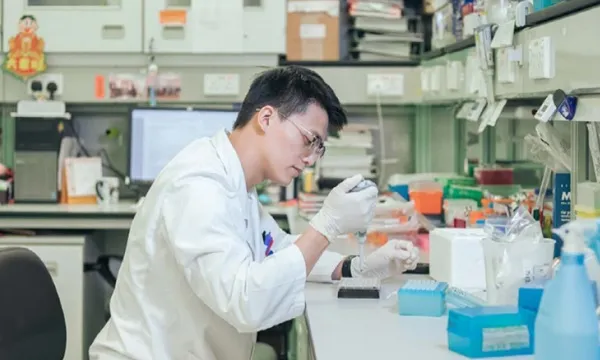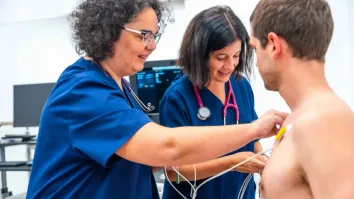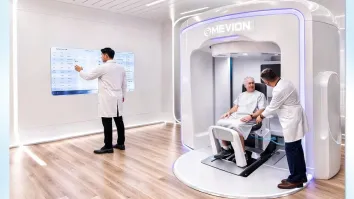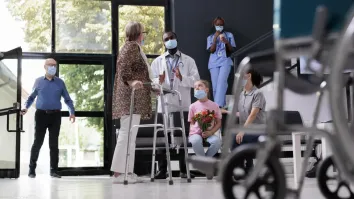
Check out HKU's remote COVID-19 disease surveillance programme
The data collected through the program could be used to identify patterns for facilitating early detection of the disease.
A remote monitoring and disease surveillance programme has been used to manage heart failure patients by monitoring their physiological parameters remotely. However, researchers from the University of Hong Kong (HKU) found another unexpected use for the device as a means for monitoring patients with diagnosed or suspected novel coronavirus disease, taking away the need for medical staff to regularly see their patients and risk exposing themselves to infection.
HKU Department of Medicine’s MD Prof. David Siu, along with infectious disease expert Dr. Ivan Hung as well as digital therapeutics firm Biofourmis and Harmony Medical Inc., conceptualised the detection and surveillance programme. It makes use of remote monitoring technology and analytics providing clinicians involved in the COVID-19 programme with clinical decision support to identify any physiological changes that could indicate a deterioration of health as soon as possible, so doctors could make early interventions for better outcomes.
It also makes use of a biosensor, which is worn on the arm by patients quarantined in their homes or clinical settings. This is equipped with several medical-grade sensors, including optical, temperature, electrodermal, accelerometer and barometer, which can derive more than 20 physiological signals from the sensor data, including temperature, heart rate, blood pulse wave, heart rate variability, respiration rate, interbeat interval and others. These signals are then fed through advanced AI and machine-learning techniques to flag key physiological changes that could indicate disease progression.
This also includes a smartphone app used for collecting qualitative data reported by patients as they respond to AI-generated “smart nuggets.” Through the clinician-facing web dashboard, treating physicians will be able to observe and be alerted to any significant physiological changes and adverse events, so they can intervene when necessary.
“As you may know I am a cardiologist, and we have already been using the device in managing heart failure patients by monitoring physiological parameters remotely. However, as these parameters that are used in monitoring heart disease are also applicable to other diseases, HKU saw the potential to apply this device to different situations such as the COVID-19 outbreak,” Siu told Healthcare Asia.
Currently, the programme is being used on patients under quarantine. Around 100 subjects will stay in the facility for 14 days, where they will be continuously monitored about their physiological parameters via the device. If they report parameters above the threshold of alert, like a higher temperature than usual, tests will be conducted and samples collected to confirm if they had an infection.
The patients will be monitored round-the-clock by their research team through a dashboard to trigger the confirmatory tests based on the reported data. As the device is fully automated, there was no need for them to look for additional manpower from the government, with further manpower only required from the university for the recruitment and monitoring of patient subjects.
Siu noted that whilst quarantined patients are currently advised to follow stringent guidelines such as regular temperature taking and reporting of symptoms at certain intervals, this reporting is highly subjective by nature and requires patients to maintain a certain degree of self-discipline.
“Not every individual would follow these guidelines, making reporting intermittent at best. Through this program, reporting can be relayed to the dashboard in near real time via round-the-clock monitoring by the device in hospitals, homes and quarantine facilities,” he said.
Further, with some COVID-19 patients being asymptomatic, they may not be able to report symptoms such as fever. “We believe that no matter how minor the symptoms a patient may report, there would be some physiological changes in the body that might not be easy to measure and cannot be done at home or in quarantine facilities,” Siu added.
The solution took them only less than two weeks to build. Siu noted that the extremely short time frame made it difficult for them to raise funding from other sources, hence relying on support from existing partners whom they have worked with some time in using the technology to detect and monitor heart failure. They were also able to clinch support from telecom service providers for data transmission via mobile phones and data plans, facilitating the data collection process.
The researchers are still relying on traditional parameters as of yet, but the data collected through the initial stages of the programme could be used to identify patterns through AI and machine learning to facilitate early detection and intervention of the disease.
“The major outcome [of using AI-based detection technology for suspected COVID-19 patients] would be early detection as this shortens the interval between quarantine and positive detection of the disease. This will increase the proportion of early detection for early intervention, and when used on a large scale, can help reduce community spread by isolating positive cases from the community much earlier,” Siu said.
HKU has been conducting various research to better understand and combat COVID-19. For instance, the State Key Laboratory for Emerging Infectious Diseases of the university has partnered with the Coalition for Epidemic Preparedness Innovations (CEPI) to rapidly develop a vaccine candidate against COVID-19.
The HKU team led by Professor Honglin Chen, along with team members Professor Zhiwei Chen, Chief Innovation Officer Dr. Yiwu He and Professor Kwok-Yung Yuen, is the latest team globally to join CEPI for development of a vaccine for COVID-19.
In June, a research team of statisticians led by Prof. Guosheng Yin, Head of the Department of Statistics and Actuarial Science, and Dr. Bin Liu, a postdoctoral fellow with the university, has integrated radiography and computer vision to develop a digital online diagnostic system for COVID-19 based on chest CT scans. The diagnostic system can help to screen suspected cases of COVID-19 and evaluate the probability of one contracting the disease.



















 Advertise
Advertise






